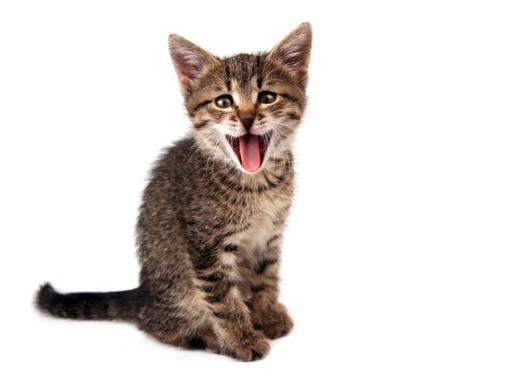Why Do Cats Meow at Humans?
Adult cats do not communicate with other cats by meowing. Only kittens mew to get their mother’s attention, but they outgrow the behavior as adults. Domestic cats have learned to meow at their humans as a means of communicating, bonding, and showing affection or to let them know that something needs attention.
Whether your cat thinks they are the mother and you are the kitten or the other way around is up for debate, however. Your kitty may be your baby, but they may feel like you’re the one who needs taking care of. Your sense of smell isn’t nearly as strong as your cat’s, so meow conversations are the way to go.
All cats can meow, but some are more talkative than others. Kittens who are frequently handled by humans and socialized when young often are chattier. Some breeds are known for being talkative, such as Siamese or Abyssinian. And as a general rule, shorter haired cats tend to be more chatty and outgoing than longer haired ones but, of course, there are always exceptions.
Perhaps you have a strong, silent type whose rare meow lets you know something is out of the ordinary. Or your kitty is a gossip girl who tells you all about her day when you come home. Every cat’s meow is special, and is among a wide repertoire of sounds your kitty can make, from purrs to growls, hisses, chirps, chatters, yowls and more.
While the answer to “why do cats meow” can be endless, the bottom line is: cats meow at humans to tell them something. Deciphering whether that something is a cheerful “Hello, I’m glad to see you!,” “Feed me now, please,” “My litter box is unacceptable,” “I’m scared,” or “My tummy hurts” can take some careful listening and know-how.
Understanding Cat Language & Learning How to Speak Cat
Just as a baby has different cries for different needs, your cat also has a unique meow to communicate everything from affection to pain. Here are some common meows and what they most likely mean.
- Short, single meow. This is typically a “Hello!” or a “Look at me!” Also, they will accept attention and pets.
- Serious or short meows. Your kitty is quite happy to see you and wants to let you know it. If you meow back, they may keep up the conversation for some time! And yes, more attention and pets, please.
- High-pitched meow. Usually a response to sudden pain, you might hear this meow if you accidentally step on your cat’s tail. Kitty will forgive you, but don’t expect immediate eye contact. When she is ready for more pets, she will let you know.
- Mid-pitch, longer meow. “I need something, but it’s not terribly urgent – yet.” or “I am displeased with you.” It may be boredom and wanting attention or to play. It may be a treat if you’ve just entered the kitchen. Kitty may also be letting you know that they don’t appreciate you making them move from their nap spot on your lap or that they would prefer not to be picked up under the armpits.
- Long, drawn-out meow or yowl. “I want it now.” This is a complaint and a legitimate need. Very often, this meow says: “I’m hungry! You forgot to feed me!” Another culprit is the litter box, which may be inaccessible or need cleaning. Perhaps the water bowl is empty. Cats will also give this meow if they are worried about an animal, such as another cat, outside the window or nervous about a houseguest. Your cat may also be irritable or in pain from an underlying medical condition. If the yowls are frequent, a visit to the vet is a good idea.
- Trill or chirp. Your cat wants you to follow them. Mother cats make this noise to their kittens to keep them close-by. Your kitty will lead you to the issue, often a dirty litter box, an empty food or water dish, a toy that has disappeared under a door, or just to stare at the bag of treats on top of the refrigerator hoping you’ll see fit to give them one – or more.
Reasons Why Your Cat Meows
There are many reasons why your cat meows, and a sudden change in their meowing behavior can signal that something is wrong. Pay attention to your cat’s meowing habits so you can be more aware of their patterns.
Here are common reasons why a cat meows:
- Pay attention to me. Sometimes when your cat meows for “no apparent reason,” they want to play. Get out the wand toy or ball for some chase or hide and seek. Pause and rub their chin and give them some eye contact. Show your appreciation with a birthday party in honor of your kitty or present them with a new play place. Let them know you’re there and give some affection and playtime.
- I’ve got to go, and there’s a problem with my litter box! Sometimes kitty will get locked out of their litter box by mistake. A closed door or a blocked passage would do it, and can happen from wind, guests who didn’t realize, or just being in the middle of cleaning or rearranging. Kitty will meow loudly for help, and if you don’t pay attention, you’ll have something else to clean up. Try to put your litter box in a place where this problem is unlikely to happen.
It could also be that the litter box is too dirty for kitty’s preference. Remember, cats have incredible senses of smell, so an odoriferous litter box will be quite noxious and unpleasant for them to use. The plaintive meows might signal kitty’s need for you to take care of some litter box maintenance. The SLIDE™ Easy Clean-Up Clumping Litter, Non-Stop Odor Control is a great litter choice to avoid a smelly box. - I’m hungry! Every cat has a certain type of meow that means, “feed me.” Some cats are more food-motivated than others. Your cat will develop a routine with you around feeding, and he will let you know when you have not delivered food at the appropriate time.
- I’m anxious or stressed. When kitty is stressed they are often more vocal than usual. If you’ve ever put your cat in a carrier and traveled, you are likely familiar with the constant meowing to let you know they are not happy. Kitty may be anxious about a change in routine at your house, such as a new pet, a new baby, houseguests, renovations, or a change in your work schedule. Give her extra attention and reassurance, and check with your vet or cat behavior specialist if it persists.
- Let me out! Let me in! Cats are notorious for wanting to go outside or inside closed doors. If you’ve locked your cat out of the bathroom, they may be on the other side meowing plaintively. If kitty is an indoor-outdoor cat, they’ll go to the outside door and meow until you let them out, and vice versa for when they want to come in. Sometimes they’ll even meow and you’ll open the door, and then they will stare at you incredulously rather than actually going outside. It’s part of kitty charm.
- I’m lost or stuck somewhere! You’ll hear your cat meow if they accidentally get shut in a cabinet, closet, dresser drawer, or any other place they may have explored without expecting a human to come along and close them in. If you have an indoor-outdoor cat, you might hear the meowing coming from a bush or a tree if they’ve gotten themselves in or up something and can’t get out or down. It’s time for a rescue!
- I'm in heat or I sense a cat in heat. If you haven’t spayed or neutered your cat, a female might yowl when she is in heat and a male might meow loudly when he knows there is a cat in heat nearby. Getting your cat spayed or neutered will eliminate this type of yowling and be healthier for your cat as well.
- I’m getting older and I’m confused. Cats will often meow more frequently as they age. Some elder cats develop a kind of dementia, and kitty can become confused or lose their way. They will meow to bring you to them for reassurance. Do it.
- I’m losing my sight or my hearing. As cats age, their hearing and eyesight may deteriorate. Elder cats may meow or yowl loudly because they cannot hear themselves or because they rely on you as a guide for moving about. Go see if they need help.
- I’m sick. Cats are notorious for masking their pain, but a plaintive yowl is a good indication something is going on. If your cat begins yowling more frequently or meows as she is trying to lay down or move, she may be suffering from arthritis or an underlying condition such as hyperthyroidism. A change in meowing patterns is good reason to schedule a check-up with your vet.
Do not ignore your cat when she meows. It’s best to assume that something’s wrong, and it’s your job to be the detective and figure out the clues and cat language. Give her the benefit of the doubt rather than assume she’s just being demanding. And with some practice, you’ll become an expert in cat language and speaking cat to your purry pal.



